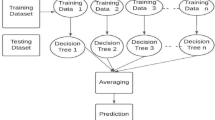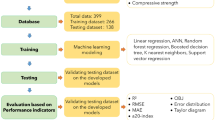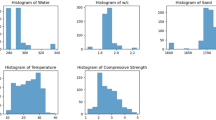Abstract
To find the best method for predicting the compressive strength of concrete mix utilizing waste marble powder, the potential of six machine learning algorithms, namely random forest, random tree, Gaussian process, support vector machines, adaptive neuro-fuzzy inference system, and artificial neural networks, was evaluated in this study. The study compares the results obtained by the aforementioned methodologies for a specific dataset. The entire dataset had 158 readings containing input variables such as cement, fine aggregates, coarse aggregates, water, waste marble powder, and curing days, while the compressive strength of the concrete mix was the output variable. Statistics assessment criteria were used to determine the effectiveness of the approaches. The results show that the support vector machine technique, with its short error bandwidth, outperforms other approaches for predicting the compressive strength of concrete, including waste marble powder. The support vector machine process predicts superior results with a higher coefficient of correlation (0.9415), the lowest mean absolute error (1.5372), and a root mean square error value of 2.1092. However, as compared to time-consuming laboratory work, the support vector machine modeling approach appears to be more cost-effective and easier. Based on sensitivity analysis, curing days were found to be one of the most important factors in predicting the compressive strength of a concrete mix, followed by marble powder and fine aggregates.












Similar content being viewed by others
Data availability statement
All data, models, and code generated or used during the study appear in the submitted article.
References
Agarwal SK, Gulati D (2006) Utilization of industrial wastes and unprocessed micro-fillers for making cost effective mortars. Constr Build Mater 20(10):999–1004. https://doi.org/10.1016/j.conbuidmat.205.06.009
Ahmed K, Nizami S, Raza N, Mahmood K (2013) Effect of micro sized marble sludge on physical properties of natural rubber composites. Chem Ind Chem Eng 19(2):281–293. https://doi.org/10.2298/CICEQ111225062A
Aliabdo AA, Abd Elmoaty AEM, Auda EM (2014) Re-use of waste marble dust in the production of cement and concrete. Constr Build Mater 50:28–41. https://doi.org/10.1016/j.conbuildmat.2013.09.005
Amlashi AT, Alidoust P, Ghanizadeh AR, Khabiri S, Pazhouhi M, Monabati MS (2022) Application of computational intelligence and statistical approaches for auto-estimating the compressive strength of plastic concrete. Eur J Environ Civ Eng 26(8):3459–3490. https://doi.org/10.1080/19648189.2020.1803144
Anitha Selvasofia SD, Dinesh A, Sarath Babu V (2021) Investigation of waste marble powder in the development of sustainable concrete. Mater Today Proc 44(6):4223–4226. https://doi.org/10.1016/j.matpr.2020.10.536
Aruntas HY, Guru M, Dayi M, Tekin I (2010) Utilization of waste marble dust as an additive in cement production. Mater Des 31(8):4039–4042. https://doi.org/10.1016/.matdes.2010.03.036
Ashish DK (2017) Feasibility of waste marble powder in concrete as partial substitution of cement and sand amalgam for sustainable growth. J Build Eng 15:236–242. https://doi.org/10.1016/j.jobe.2017.11.024
ASTM D6913-04 (1992) Standard test methods for particle size distribution of soils. American Society for Testing of Materials, Pennsylvania
ASTM C184–94e1 (1994) Standard Test Method for Fineness of Hydraulic Cement by the 150-µm (No. 100) and 75-µm (No. 200) Sieves (Withdrawn 2002), ASTM International; West Conshohocken, PA, 1994, www.astm.org. Accessed Feb 2022
ASTM C187-16 (2016) Standard Test Method for Amount of Water Required for Normal Consistency of Hydraulic Cement Paste, ASTM International; West Conshohocken, PA, 2016, www.astm.org. Accessed Feb 2022
ASTM C151/C151M-18 (2018) Standard Test Method for Autoclave Expansion of Hydraulic Cement, ASTM International; West Conshohocken, PA, 2018, www.astm.org. Accessed Feb 2022
ASTM C191-19 (2019) Standard Test Methods for Time of Setting of Hydraulic Cement by Vicat Needle, ASTM International; West Conshohocken, PA, 2019, www.astm.org. Accessed Feb 2022
ASTM C150/C150M-21 (2021) Standard Specification for Portland Cement, ASTM International; West Conshohocken, PA, www.astm.org. Accessed Feb 2022
Ayat H, Kellouche Y, Ghrici M, Boukhatem B (2018) Compressive strength prediction of limestone filler concrete using artificial neural networks. Adv Comput Des 3(3):289–302. https://doi.org/10.12989/acd.2018.3.3.289
Belaidi ASE, Azzouz L, Kadri E, Kenai S (2012) Effect of natural pozzolana and marble powder on the properties of self-compacting concrete. Constr Build Mater 31(2012):251–257
Binici H, Shah T, Aksogan O, Kaplan H (2008) Durability of concrete made with granite and marble as recycle aggregates. J Mater Process Technol 208(1–3):299–308. https://doi.org/10.1016/j.jmatprotec.2007.12.120
Biswas R, Bardhan A, Samui P, Rai B, Nayak S, Armaghani DJ (2021) Efficient soft computing techniques for the prediction of compressive strength of geopolymer concrete. Comput Concr 28(2):221–232
Breiman L (2001) Random forests. Mach Learn 45:5–32
Chopra P, Sharma RK, Kumar M, Chopra T (2018) Comparison of machine learning techniques for the prediction of compressive strength of concrete. Adv Civ Eng. https://doi.org/10.1155/2018/5481705.2
Chore HS, Magar RB (2017) Prediction of unconfined compressive and Brazilian tensile strength of fiber reinforced cement stabilized fly ash mixes using multiple linear regression and artificial neural network. Adv Comput Des 2(3):225–240. https://doi.org/10.12989/acd.2017.2.3.225
Corinaldesi V, Moriconi G, Naik TR (2010) Characterization of marble powder for its use in mortar and concrete. Constr Build Mater 24(1):113–117. https://doi.org/10.1016/j.conbuildmat.2009.08.013
Cui Y, Liu J, Wang L, Liu R, Pang B (2020) A model to characterize the effect of particle size of fly ash on the mechanical properties of concrete by the grey multiple linear regression. Comput Concr 26(2):175–183. https://doi.org/10.12989/cac.2020.26.2.175
Deepa C, SathiyaKumari K, Pream Sudha V (2010) Prediction of the compressive strength of high-performance concrete mix using tree based modeling. Int J Comput Appl 6(5):18–24
Demirel B (2010) The effect of using waste marble dust as fine sand on the mechanical properties of the concrete. Int J Phys Sci 5(9):1372–1380
Eliche-Quesada D, Corpas-Iglesias FA, Perez-Villarejo L, Iglesias-Godino FJ (2012) Recycling of sawdust, spent earth from oil filtration, compost and marble residues for brick manufacturing. Constr Build Mater 34(2012):275–284. https://doi.org/10.1016/j.conbuildmat.2012.02.079
Elyamany HE, Abd Elmoaty AEM, Mohamed B (2014) Effect of filler types on physical, mechanical and microstructure of self compacting concrete and flow-able concrete. Alex Eng J 53(2):295–307. https://doi.org/10.1016/j.aej.2014.03.010
Ergun A (2011) Effects of the usage of diatomite and waste marble powder as partial replacement of cement on the mechanical properties of concrete. Constr Build Mater 25(2):806–812. https://doi.org/10.1016/j.conbuildmat.2010.07.002
Gamage S, Palitha S, Meddage DPP, Mendis S, Azamathulla HM, Rathnayake U (2022) Influence of crumb rubber and coconut coir on strength and durability characteristics of interlocking paving blocks. Buildings 12:1001. https://doi.org/10.3390/buildings12071001
Ghazanfari N, Gholami S, Emad A, Shekarchi M (2017) Evaluation of GMDH and MLP networks for prediction of compressive strength and workability of concrete. Bull Soc R Sci Liege 86:855–868. https://doi.org/10.25518/0037-9565.7032
Gholamzadeh-Chitgar A, Berenjian J (2019) Elman ANNs along with two different sets of inputs for predicting the properties of SCCs. Comput Concr 24(5):399–412. https://doi.org/10.12989/cac.2019.24.5.399
Goh ATC, Goh SH (2007) Support vector machines: Their use in geotechnical engineering as illustrated using seismic liquefaction data. Comput Geotech 34(5):410–421. https://doi.org/10.1016/j.compgeo.2007.06.001
Hassan AA, Mawat MJ, Dawood AS (2019) Prediction of compressive strength of concrete containing pozzolanic materials by applying neural networks. Int J Civ Eng Technol 10(2):526–537
Hebhoub H, Aoun H, Belachia M, Houari H, Ghorbel E (2011) Use of waste marble aggregates in concrete. Constr Build Mater 25(3):1167–1171. https://doi.org/10.1016/j.conbuildmat.2010.09.037
Kore SD, Vyas AK (2016) Impact of marble waste as coarse aggregate on properties of lean cement concrete. Case Stud Constr Mater 4:85–92. https://doi.org/10.1016/j.cscm.2016.01.002
Kumar A, Rupali S (2019) Prediction of UCS and STS of Kaolin clay stabilized with supplementary cementitious material using ANN and MLR. Adv Comput Des 5(2):195–207. https://doi.org/10.12989/acd.2020.5.2.195
Madandoust R, John HB, Reza G (2012) Prediction of the concrete compressive strength by means of core testing using GMDH-type neural network and ANFIS models. Comput Mater Sci 51(1):261–272. https://doi.org/10.1016/j.commatsci.2011.07.053
Mansoor J, Shah SAR, Khan MM, Sadiq AN, Anwar MK, Siddiq MU, Ahmad H (2018) Analysis of mechanical properties of self-compacted concrete by partial replacement of cement with industrial wastes under elevated temperature. Appl Sci 8(3):364. https://doi.org/10.3390/app8030364
Meddage P, Ekanayake I, Perera US, Azamathulla HM, Said MAM, Rathnayake U (2022) Interpretation of machine-learning-based (black-box) wind pressure predictions for low-rise gable-roofed buildings using shapley additive explanations (SHAP). Buildings. https://doi.org/10.3390/buildings12060734
Memon M, Jhatial A, Rid Z, Rind T, Sandhu A (2019) Marble powder as fine aggregates in concrete. Eng Technol Appl Sci Res 9(3):4105–4107. https://doi.org/10.48084/etasr.2698
Mishra YK, Mishra S, Jayswal SC et al (2022) Comparative analysis of DoE-based hybrid multiobjective optimization techniques for inclined laser drilling of glass fiber reinforced plastics. Multiscale Multidiscip Model Exp Des. https://doi.org/10.1007/s41939-022-00117-w
Nhu VH, Shahabi H, Nohani E, Shirzadi A, Ansari NA, Bahrami S, Miraki S, Geertsema M, Nguyen H (2020) Daily water level prediction of Zrebar lake(Iran): A Comparison between M5P, random forest, random tree and reduced error pruning trees algorithms. Int J Geo-Inf 9:479. https://doi.org/10.3390/ijgi9080479
Omar OM, Abd Elhameed GD, Sherif MA, Mohamadien HA (2019) Influence of limestone waste as partial replacement material for sand and marble powder in concrete properties. HBRC J 8(3):193–203. https://doi.org/10.1016/j.hbrcj.2012.10.005
Rai B, Naushad KH, Kumar A, Rushad TS, Duggal SK (2011) Influence of marble powder /granules in concrete mix. Int J Civ Struct Eng 1(4):827–834
Rasmussen CE, Williams CKI (2006) Gaussian processes for machine learning. The MIT Press, Cambridge
Salcedo-Sanz S, Rojo-Alvarez JL, Martinez-Ramon M, Camps-Valls G (2014) Support vector machines in engineering: an overview. Wires Data Min Knowl Discov 4(3):234–267. https://doi.org/10.1002/widm.1125
Sepahvand A, Singh B, Sihag P, Samani AN, Ahmadi H, Nia SF (2019) Assessment of the various soft computing techniques to predict sodium absorption ratio (SAR). ISH J Hydraul Eng. https://doi.org/10.1080/09715010.2019.1595185
Sharma N, Thakur MS, Goel PL, Sihag P (2020) A review: sustainable compressive strength properties of concrete mix with replacement by marble powder. J Achiev Mater Manuf Eng 98(1):11–23. https://doi.org/10.5604/01.3001.0014.0813
Sharma N, Thakur MS, Upadhya A, Sihag P (2021) Evaluating flexural strength of concrete with steel fibre by using machine learning techniques. Compos Mater Eng 3(3):201–220. https://doi.org/10.12989/cme.2021.3.3.201
Shirule PA, Rahman A, Gupta RD (2012) Partial replacement of cement with marble. Int J Adv Eng Res Stud 30(2012):2
Sobhani J, Najimi M, Pourkhorshidi AR, Parhizkar T (2010) Prediction of the compressive strength of no-slump concrete: a comparative study of regression, neural network and ANFIS models. Constr Build Mater 24(2010):709–718. https://doi.org/10.1016/j.conbuildmat.2009.10.037
Soliman NM (2013) Effect of using marble powder in concrete mixes on the behavior and strength. Int J Curr Eng Technol 3(5):1863–1870
Suthar M (2019) Applying several machine learning approaches for the prediction of unconfined compressive strength of stabilized pond ashes. Neural Comput Appl. https://doi.org/10.1007/s00521-019-04411-6
Talah A, Kharchi F, Chaid R (2015) Influence of marble powder on high performance concrete behavior. Proc Eng 114(2015):685–690. https://doi.org/10.1016/j.proeng.2015.08.010
Thakur MS, Pandhiani SM, Kashyap V, Upadhya A, Sihag P (2021) Predicting bond strength of FRP bars in concrete using soft computing techniques. Arab J Sci Eng. https://doi.org/10.1007/s13369-020-05314-8
Topcu IB, Bilir T, Uygunoglu T (2009) Effect of waste marble dust content as filler on properties of self-compacting concrete. Constr Build Mater 23(5):1947–1953. https://doi.org/10.1016/j.conbuildmat.2008.09.007
Upadhya A, Thakur MS, Sharma N, Sihag P (2021) Assessment of soft computing-based techniques for the prediction of marshall stability of asphalt concrete reinforced with glass fiber. Int J Pavement Res Technol. https://doi.org/10.1007/s42947-021-00094-2
Uygunotlu T, Topcu IB, Celik AG (2014) Use of waste marble and recycled aggregates in self-compacting concrete for environmental sustainability. J Clean Prod 84(1):691–700. https://doi.org/10.1016/j.jclepro.2014.06.019
Uysal M, Sumer M (2011) Performance of self-compacting concrete containing different mineral admixtures. Constr Build Mater 25(11):4112–4120. https://doi.org/10.1016/j.conbuildmat.2011.04.032
Uysal M, Yilmaz K (2011) Effect of mineral admixtures on properties of self-compacting concrete. Cem Concr Compos 33(7):771–776. https://doi.org/10.1016/j.cemconcomp.2011.04.005
Vaidevi C (2013) Engineering study on marble dust as partial replacement of cement in concrete. Indian J Eng 4(7):14–16
Vapnik VN (1995) The nature of statistical learning theory. Springer, New York
Yaswanth KK, Revathy J, Gajalakshmi P (2021) Artificial intelligence for the compressive strength prediction of novel ductile geopolymer composites. Comput Concr 28(1):55–68. https://doi.org/10.12989/cac.2021.28.1.055 (10.12989/cac.2021.28.2.221)
Acknowledgements
We, the authors, would like to acknowledge the researchers whose research findings we have referred to in this review paper.
Author information
Authors and Affiliations
Corresponding author
Ethics declarations
Conflict of interest
There is no conflict of interest for the authors with anyone connected to this research paper.
Additional information
Publisher's Note
Springer Nature remains neutral with regard to jurisdictional claims in published maps and institutional affiliations.
Rights and permissions
Springer Nature or its licensor holds exclusive rights to this article under a publishing agreement with the author(s) or other rightsholder(s); author self-archiving of the accepted manuscript version of this article is solely governed by the terms of such publishing agreement and applicable law.
About this article
Cite this article
Sharma, N., Thakur, M.S., Upadhya, A. et al. Soft computing techniques for assessment of strength of concrete with marble powder. Multiscale and Multidiscip. Model. Exp. and Des. 6, 81–96 (2023). https://doi.org/10.1007/s41939-022-00130-z
Received:
Accepted:
Published:
Issue Date:
DOI: https://doi.org/10.1007/s41939-022-00130-z




